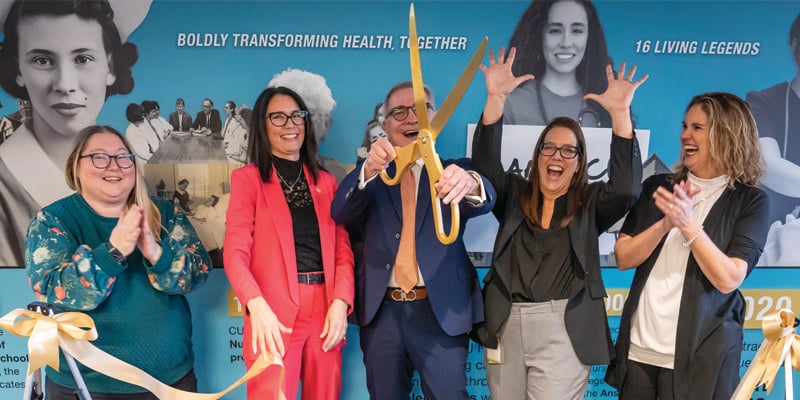An innovative partnership between Durango-based Fort Lewis College and the University of Colorado College of Nursing at Anschutz Medical Campus recently got a significant gift from the Colorado Health Foundation.
The foundation provided a $1.7 million grant to help fund a collaboration between the two colleges that will create a four-year undergraduate degree in nursing that will serve the Four Corners region – bringing CU College of Nursing’s campus expertise to the rural and Indigenous-serving campus in Southwest Colorado. The program aspires to strengthen the healthcare workforce in rural and tribal communities throughout Colorado at a time when the region’s healthcare resources are drastically scarce.
“This partnership is all about serving the community and the state,” says CU College of Nursing Senior Associate Dean for Faculty and Students Amy Barton, PhD, RN, FAAN, ANEF. “It is a sustainable workforce strategy for the Four Corners region as well as other areas. I don’t know of any other nursing program in the state with such a rural focus.”
As CU Nursing’s designated lead for the program, known as the CU Nursing-Fort Lewis College Collaborative, Dr. Barton is charged with implementing the program.
Components of the project include renovating an existing space at Fort Lewis College to build a new culturally inclusive simulation suite for nursing students; developing an Indigenous-focused and culturally sensitive curriculum for the college; and scholarships for program participants with priority going to Colorado Native American students.
“This exciting new program initiates nursing education at Fort Lewis College, as we do not currently have a nursing program in place,” says Fort Lewis College Provost and Vice President for Academic Affairs Cheryl Nixon. “We are proud to have earned recognition for this work from The Colorado Health Foundation.”
About the grant
The grant was coordinated by representatives from the Fort Lewis College Foundation, the University of Colorado at Anschutz Campus CU Office of Advancement, and the Colorado Health Foundation. Initial conversations came together late last year.
“We are so pleased to support this innovative new program, which will bring members of the Indigenous community into the healthcare workforce so that more patients receive high-quality care that is reflective of who they are and what they need for improved health,” says Khanh Nguyen, senior program officer at The Colorado Health Foundation.
In addition to the $1.7 million Colorado Health Foundation grant, the program got a $1 million gift earlier this year from the Karen Zink Family Fund for Nursing Education Leadership. Zink’s family roots in Southwestern Colorado date back to the early 20th century. A CU Nursing alumna, Zink’s (MS ’87) lifelong interest in nursing was inspired by her mother, Marilyn Mason Short. Short was a nursing leader who helped establish the first emergency department at Mercy Hospital in Durango. Zink’s daughter, Heidi, continues the family tradition of working as a certified nurse-midwife with Southwest Midwives.
About the program
The first cohort of the CU Nursing Fort Lewis College Collaborative is expected to arrive at the Fort Lewis College campus in the fall of 2023. The program will incorporate Fort Lewis College’s liberal arts emphasis with the world-class nursing curriculum from CU College of Nursing. Barton and colleagues at CU College of Nursing are already consulting on the simulation lab renovation and collaborating with faculty and administrators at Fort Lewis College and regional healthcare providers on the curriculum.
Like the cutting-edge simulation labs at CU Nursing at the Anschutz Medical Campus, the simulation labs at Fort Lewis College will be designed to look like hospital rooms featuring life-like patient “mannequins” that nursing students use to practice healthcare techniques. Mannequins at the Fort Lewis College lab will reflect various skin tones. They will also be programmed to exhibit common health concerns and characteristics of rural patients.
For the curriculum piece, Fort Lewis College will create a cadre of prerequisite courses for a pre-nursing certificate. Fort Lewis College faculty are evaluating course development or existing courses that will provide more targeted information about rural or indigenous health. CU Nursing will help develop the curriculum into more advanced courses for junior and senior year students at Fort Lewis College.
“It has to be the same curriculum for accreditation purposes, but what we’re going to do is embed tailored activities that also focus on rural and indigenous health,” Barton says. “What we want to do is build in the competencies related to nursing while recognizing that they will be achieving those competencies in a community-based environment.”
Native American students from any federally recognized tribe can attend Fort Lewis College tuition-free under a waiver provided by the state of Colorado based on a federal agreement that has been honored for more than 100 years. The scholarships are intended to support students’ tuition when they technically transfer to CU College of Nursing in their junior year and lose the waiver. Barton says the scholarships are intended to support the Native American tuition waiver at Fort Lewis College and the tuition gap between Fort Lewis College and CU Nursing.
Partnership benefits all of Colorado
Along with being aligned with the vision and values of both colleges, the project will benefit the state of Colorado and establish a model for rural nursing education throughout the country.
“We maintain our designation as a leader and an innovator in nursing education,” Barton says. “We’re the birthplace of nurse practitioner education. We’re the birthplace of caring science, and now we’re going to be the birthplace of an innovative partnership that will meet several goals -- including the community's goals to create social mobility with students who might not otherwise have had these opportunities.”
Barton adds that the project will allow both CU College of Nursing and Fort Lewis College to create a unique kind of partnership program and to learn how to tailor CU College of Nursing’s learning activities to meet the needs of a unique rural community.
“We are thrilled to be bringing the cutting-edge expertise of CU Nursing to southwestern Colorado,” Nixon says. “This program signifies the importance of rural, community-based, and Indigenous-serving nursing as a key piece to improving healthcare in Colorado overall.”
Next steps for the project
Barton will work with colleagues from both colleges in developing the project in the months and years to come. Along with consulting on the simulation piece and building curriculum, both colleges are searching for a director to lead the collaborative and ensure the program is successful.
While CU Nursing’s curriculum piece won’t be officially activated until the fall of 2025, there’s much work to be done.
“A partnership of this magnitude is challenging logistically,” says CU Nursing Director of Admissions and Student Affairs Kristi Rodriguez. “Both institutions are actively engaged in determining the curriculum structure, clinical experiences, staffing, and enrollment pieces, including admissions, financial aid, and registration. All of these are foundational elements to building a successful program.”



